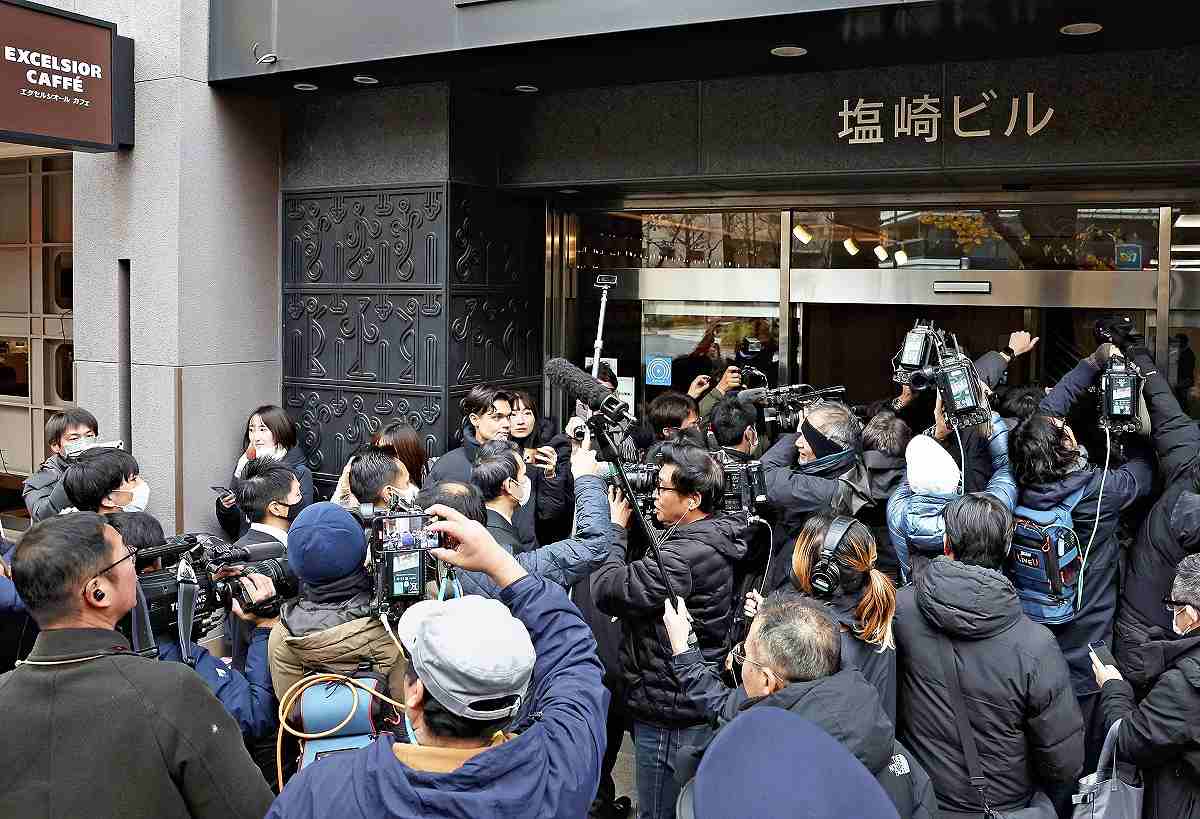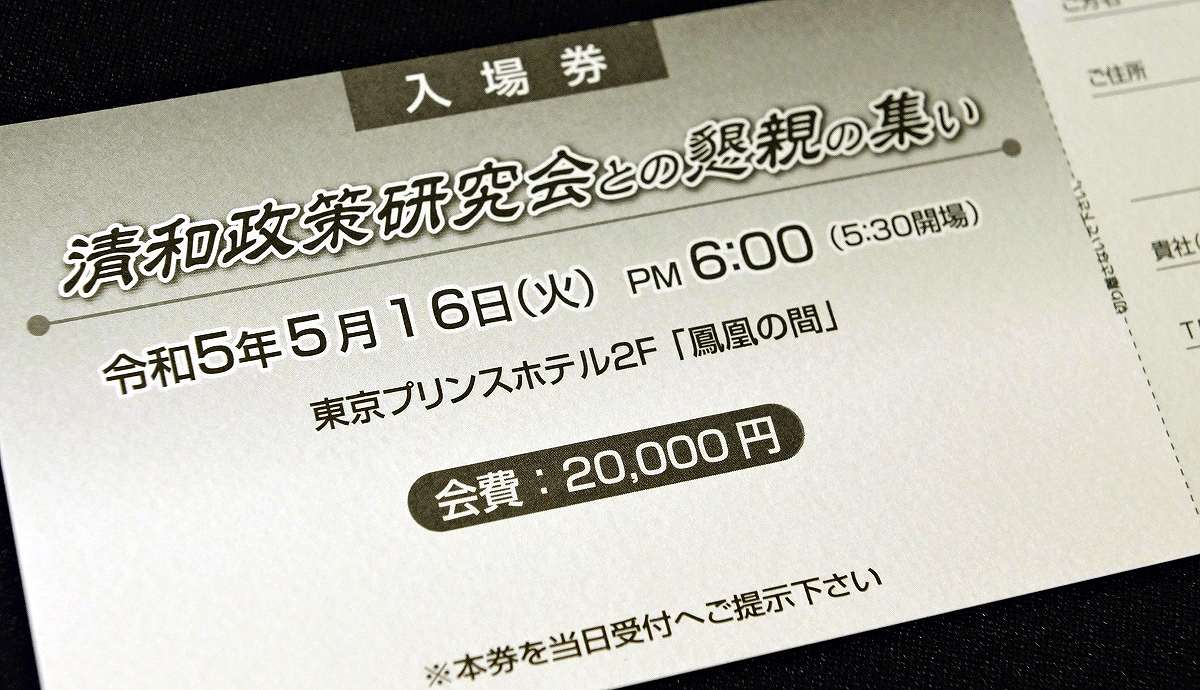Unreported Funds — The dark side of factions / Excess Funds Said Returned to Members Since Mid-1990s

Reporters gather in front of the building where the office of the LDP’s Abe faction is located as members of the Tokyo District Public Prosecutors Office enter the building in Chiyoda Ward, Tokyo on Tuesday.
21:00 JST, December 20, 2023
This is the first installment of a series about the dark side of Japan’s political factions, examining unreported funds accumulated from political fundraising parties.
***
About a dozen prosecutors from the special investigation squad of the Tokyo District Public Prosecutors Office were among those who arrived at an office building near the Diet in central Tokyo at around at 10 a.m. on Tuesday.
The building houses the office of the Abe faction, also known as the Seiwa Seisaku Kenkyukai (Seiwakai), of the Liberal Democratic Party. Prosecutors entered the building one after another as the press turned their cameras on them.
It is unusual for the ruling party’s largest faction to be the subject of a compulsory investigation.
“I thought there was no way such irresponsible handling of funds could be allowed,” said a woman who used to be a secretary to a member of the faction, which was formerly led by Prime Minister Shinzo Abe.
She has vivid memories of a political fundraising party held at a luxury hotel in Tokyo in the autumn of 2020. Each member of the faction was allotted a quota of party tickets to sell at ¥20,000 each. The Diet member she worked for was assigned 30 tickets totaling ¥600,000.
The lawmaker ultimately sold nearly 60 tickets, nearly double their quota, to local businesspeople and others amid the spread of COVID-19.
Shortly thereafter, the woman received a call from the faction office saying, “We can return more than ¥500,000 to your office, so come get it.” The money was a kickback from the lawmaker’s ticket sales for the fundraising party.

A ticket to a fundraising party for the Abe faction earlier this year. Lawmakers reportedly deliver tickets with a letter of invitation and a payment slip to their supporters.
The woman asked the faction office staffer, “Should we report the money as a caucus donation on the political funds report?” The staffer responded bluntly, “It doesn’t matter,” and then shockingly declared “because the faction office has no intention of reporting it that way.”
A donation that was not included in the faction office’s political funds report could not possibly be declared as income for the lawmaker’s office.
Another secretary at the lawmaker’s office received more than ¥500,000 in an unreported fund.
Now, more than three years later, the special investigation squad has launched a compulsory investigation into both the Abe faction and the Nikai faction, or Shisuikai, led by heavyweight Toshihiro Nikai. The investigation has sent shock waves through Nagatacho, the area of Tokyo known as Japan’s political nerve center.
The lawmaker the woman worked for held a key position in the government but was forced out of his position on Dec. 14.
The question is why the unreported funds were created and what the money was used for. A full-scale investigation by the special investigation squad is now underway.
One day in the middle of this month, a House of Representatives member of the Abe faction was facing a prosecutor in an interrogation room at the Tokyo District Public Prosecutors Office.
After a brief introduction, the prosecutor asked the lawmaker a series of questions, including “Did you know about the kickbacks?” and “How did you use the money that was returned to you?”
The lawmaker later said they kept answering carefully, telling themselves, “Just tell the truth in a straightforward manner.” One question went to the heart of the matter: “You knew the money was not being reported in the political funds reports, didn’t you?”
Over the past three years, several millions of yen were returned by the faction office. The money is believed to have been used to cover the operating expenses of the lawmaker’s office, and not been diverted to anything illicit, but it was not included in political finance reports.
The lawmaker defended themselves, saying the faction had told them that the money represented “political activity expenditures” from the party to an individual and that there was no need to include it in the report.
Toward the end of the questioning by the prosecutor, the lawmaker insisted, “I didn’t think I was obligated to include it in the report.” The prosecutor replied only, “I’ll have to question you again.”
Political activity expenditures are supposed to be paid directly from the party to individual politicians.
“As long as the [income from political fundraising parties] is being returned by the faction, the explanation that the money is from the party is hard to accept,’” a prosecutor said.
Single-seat constituencies
The current scandal involves money in excess of faction members’ quotas for party ticket sales being returned to faction members, with some using the money as an unreported fund. The single-seat constituencies that were introduced in the 1996 lower house elections were one factor in the development of this practice.
The role of the party headquarters increased, as it has the right to approve candidates, and factions turned to income from fundraising parties, as they were unable to raise as much money as they had hoped.
The more faction members sell party tickets, the more money a faction receives, and the greater the cohesion and loyalty of the members who receive funds from the faction.
The Abe faction customarily did not list the returned money in political funds reports, but instead used it as unreported funds.
Some lawmakers have said this system was firmly in place by the early 2000s, when former Prime Minister Yoshiro Mori was chairman of the Abe faction.
The Abe faction used to be on the sidelines of the LDP and was traditionally considered to have a weak financial base. The recent incident is believed to have been caused by the Abe faction’s struggle to maintain its structure, an observer said.
Sales quotas
Why would such hidden funds strengthen a faction? The key to this question is the existence of sales quotas for political fundraising parties.
The sales quotas are decided according to the number of times individual lawmakers have been elected and their position, such as experience serving as cabinet ministers. The amount of the quota reportedly ranges from several hundreds of thousands of yen to several million yen.
But revenue in excess of a lawmaker’s quota is seen as that lawmaker’s contribution to the faction, and the faction may repay them by giving them key posts in the party or government. Or even if such a post cannot be given, the faction can provide kickbacks of hidden funds.
“Once a lawmaker becomes a cabinet minister, his or her sales quota gets higher, such as ¥5 million or so, making it hard to meet the quota,” said a secretary of an Abe-faction lawmaker who has been elected three times. “The money we receive in excess of sales quotas is pooled at the office as funds to achieve quotas in the future.”
The secretary said the lawmaker managed to sell party tickets in excess of sales quotas several times, but only the allocated quota amount was paid to the faction. Instead of giving the excess to the faction, the lawmaker’s office pooled the money to prepare for the future. That allowed it to make up for shortfalls even if it failed to meet a sales quota, and thereby maintain its status within the faction.
Within the LDP, the Shisuikai faction and Kochikai, the faction that Prime Minister Fumio Kishida led until recently, are said to have recorded revenues from political fundraising parties below the actual amount in their factions’ political fund reports.
In contrast, the Abe faction is suspected of failing to record both the excess amounts and the amounts that were given back to the lawmakers who sold the tickets, thus creating a large amount of hidden funds.
“Its arrogance as the party’s largest faction made it reckless, leading it to believe something like this would be overlooked,” said a former cabinet member.
A man in charge of accounting at the Abe faction is alleged to have instructed lawmakers the practice of kickbacks and not listing the excess amounts in political funds reports. The faction is thus suspected to have systematically led the scheme.
A secretary of a House of Councilors member in the Abe faction learned about the existence of secret funds several years ago, when the lawmaker managed to sell party tickets in excess of the allocated quota for the first time and received the excess money at the faction’s office.
“I was instructed not to list the money in the political fund reports, and I knew that was wrong,” the secretary said. “But all we could do was follow the long-time practice.”
Money and politics
The LDP has long faced harsh criticism over issues involving money and politics. Then Prime Minister Noboru Takeshita was forced to step down over the Recruit stock-for-favors scandal, which came to light in 1988. In an embezzlement scandal involving the Japan Dental Association in the 2000s, the faction led by former Prime Minister Ryutaro Hashimoto was found to have received ¥100 million in illegal donations. Former Chief Cabinet Secretary Kanezo Muraoka, who was the faction’s acting chairman, was convicted over the wrongdoing.
“If we can’t make a fresh start this time, it will mean the end for the LDP,” a close aide to Prime Minister Fumio Kishida said.
Top Articles in Politics
-

Japan PM Takaichi’s Cabinet Resigns en Masse
-

Sanae Takaichi Elected Prime Minister of Japan; Keeps All Cabinet Appointees from Previous Term
-

Japan’s Govt to Submit Road Map for Growth Strategy in March, PM Takaichi to Announce in Upcoming Policy Speech
-

LDP Wins Historic Landslide Victory
-

LDP Wins Landslide Victory, Secures Single-party Majority; Ruling Coalition with JIP Poised to Secure Over 300 seats (UPDATE 1)
JN ACCESS RANKING
-

Japan PM Takaichi’s Cabinet Resigns en Masse
-

Japan Institute to Use Domestic Commercial Optical Lattice Clock to Set Japan Standard Time
-

Israeli Ambassador to Japan Speaks about Japan’s Role in the Reconstruction of Gaza
-

Man Infected with Measles Reportedly Dined at Restaurant in Tokyo Station
-

Videos Plagiarized, Reposted with False Subtitles Claiming ‘Ryukyu Belongs to China’; Anti-China False Information Also Posted in Japan






















